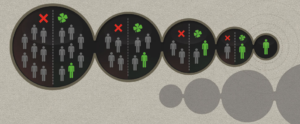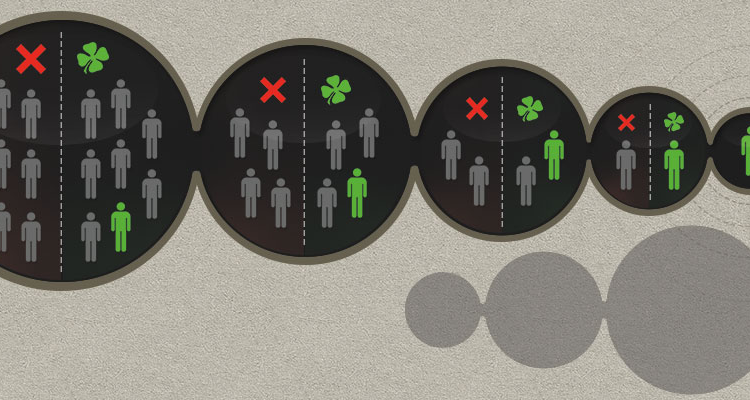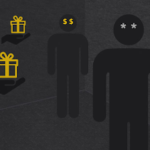How to judge a betting tipsters abilities
Some bettors delay the process of making bets and using tipsters. Sadly, it is easy to make confounding factor records show statistically significant predictive power or just good luck. This article discusses how to use survivor bias in judging a tipster.

For example, there is a tipster who has a 100% track record of predicting football matches for five years, and there is even a possibility of success-earning a profit of $ 50,000. Impressive? Yet if you’ve learned the star tipster was just a monkey.
Suppose we performed a simulation that sees 10,000 football tipsters (or monkeys, which is not essential), and the probability of annual income of each tipster is $ 10,000, or a loss of $ 10,000 per year is 50%. They will eliminate if they had the whole year losing.
The tipster/monkey can make predictions by pressing one of those two buttons. When we conduct a one-year test, our 5,000 tipsters will make a profit of $ 10,000, and $10,000 in red and binned in the same amount. In the second year, we will have 2,500 correctly registered monkeys. If we continue to the fifth year, we will get 313 monkeys from the initial cohort who would be able to statistically make successive correct predictions and $50,000 by sheer chance.
Confusing survivors with Profesional
This concept is called survivorship bias, and it has immense importance in the real world of tipsters, as the successful tipster currently on hottips.com leading the tipster league table might be a lucky monkey pressing a button.
What are the critical factors affecting this process? The initial specimen size is vital. If, in this cycle, you only pay attention to the winner and ignore all other monkeys that will generate billions of dollars of nonsense, then you will be confused by randomness. One simple truth is that some of the participants would end up looking like a savant by sheer chance starting from a large enough sample.
The other important aspect is the incident likelihood. For instance, using a fair coin toss (50 over 50 chance of heads or tails), but a turf accountant would have an advantage in the real world. Re-running our test with higher margins yields less fortunate winners: the smaller the margin, the more comfortable long-term success is to achieve.
An amusing illustration of survival bias
There are plenty of excellent examples of survival bias. Still, a particularly smart trick by the famous illusionist Derren Brown in a 2008 show called “The System” showed how cleverly it could be to deceive.
The display based on the premise that a method may build to “guarantee the winner of the game,” this is the common saying of regular bettors. Immediately after the show followed Khadisha, Brown sent anonymously five correct horse racing predictions straight. There is no trick in work, the tips are accurate and fair, and the plan is moving towards the culmination of the sixth and final prediction where Khadisha invested in his own money $ 4,000 but still lost even supported by Brown’s 100% tipping record.
There was no program, of course, Khadisha is merely a product of survival bias.
Brown had begun by contacting 7,776 people (adequate sample size) and dividing them into six groups by giving each group a different horse from a six-horse race. Remember, the number of variables is just as significant as the number of assumptions in how quickly the size of the initial sample decreases.
After each house race, 5/5 of the people lost and fell out of the program (like our failed monkeys), and the survivors’ equal proportions randomly sent out another set. It happened Kadisha was the sole survivor, winning five consecutive times.
The primary lesson of sports betting is that anyone can make an unbeaten run, and the more unlikely it is: luck plays a more significant role. When your typewriting monkey generates “The Complete Works of Shakespeare” from a multibillion collection, don’t get too excited. But if he does replicate the feat, please carefully observe.
Evaluate a tipster’s abilities by using a simple formula
An easy way to measure the true abilities of a tipster is by taking the square root of the total number of choices and adding that amount to a half of the total bets made:
√(No. Selections) + ½ (Total Plays Made)
For instance, if he has 400 tips, the square root will be 20, adding up to half of 400, giving 220 possible wins in total.
When the tipster is 20 selections above 200, then it is above average two standard deviations. There’s around a 1/40 chance of doing so by a 50 percent handicapper. So to be this unusual, a player with 400 selections will need to go 220→180, or 60→40 with 100 selections.
Without becoming a master statistician, you can easily see that the more selections you can inspect, the simpler it is to assess a player. For certain situations, if they have a lot of plays, it is easier to pursue those with a lower winning rate.



